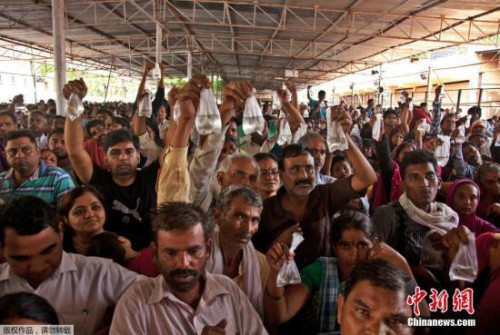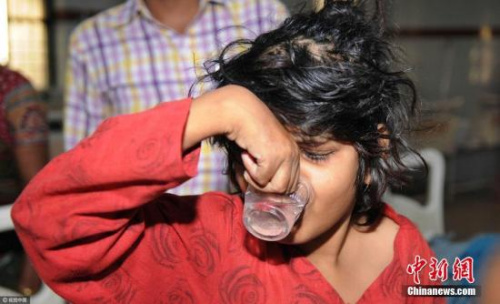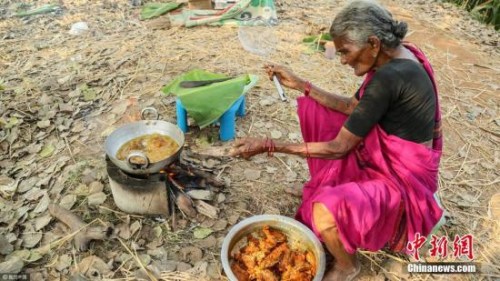Seventy years later, India’s 200 million Dalits are still "like dirt", making it difficult to break through the caste barrier.
After 70 years, India’s 200 million Dalits are still "like dirt" and it is difficult to break through the caste barrier
[Special correspondent of Global Times in India Zhou Liangchen Special correspondent of Global Times Zhang Xiaozhu Global Times reporter Xing Xiaotong] On the 25th, India officially welcomed Cowende, the president from the untouchable class. This is the second untouchable president in 20 years. Because Cowend’s campaign opponent is also an "untouchable", this makes many people feel that "untouchable" is getting more and more attention in India, and their spring has come. The actual situation is far from so optimistic. In the decades since Indian law abolished the caste system, although the lives of the people in Park Jung Su (also known as untouchables) at the bottom have been greatly improved, and many elites have emerged from the political and business circles, they are, after all, a very small number of the 200 million untouchables. In Indian society dominated by Hinduism, especially in rural areas, most "untouchables" are still deeply bound by traditional "hidden rules". Although the modern democratic electoral system has made "untouchables" the darling of the election season, the reality is that "someone here is not disturbed by his life experience when he becomes president, and it is embarrassing to be murdered and raped there."

Contrast-someone is president and someone is on hunger strike.
"A Da Park Jung Su has become the president of this country, but in a village in Andhra Pradesh, 300 Da Park Jung Su families are facing social exclusion." On the 25th, Cowende, who was born as a Dalit, was formally sworn in as the President of India, which was a big day for the large Dalit class. However, the website of India Today reported that more than 300 Dalit families in Andhra Pradesh began to hunger strike indefinitely on the same day to protest against discrimination by high caste groups.
The incident originated on April 24th when the local people in Park Jung Su erected a statue of Ambedkar (a lawyer from "Dalit" background, known as "the father of Indian Constitution"), but it was opposed by the high caste community, and the statue was removed by unidentified people within a few hours. Moreover, because Da Park Jung Su people mainly work in agriculture but have no land, high-caste landowners refuse to continue to employ them.
On the 26th, New Delhi TV station paid attention to the reaction of Park Jung Su community in Bonda, the northern part of Cowend’s hometown. According to the article, Cowend’s inauguration as president has hardly caused repercussions in the village of Mubarakpur, where Park Jung Su people are the majority, and everyone can’t agree whether he will bring good luck to the people of Park Jung Su. A pharmacist in Da Park Jung Su mentioned that local villagers had recently built a separation wall. According to this report, in another Da Park Jung Su village 5 kilometers away, many people still don’t know who Cowende is.
Not only the people in Park Jung Su who are at the bottom, but also to many Indians, Cowend is a stranger. Some analysts said that the ruling People’s Party launched Cowende in order to win the votes of the "untouchables" in the 2019 general election. After all, there are 200 million people in this group. There are "untouchables" complaining. Instead of this, it is better to let "untouchables" enter the temple and get water from the well …

Participation in the situation-from discrimination to violence
"Dalits, like the word proletariat, stand for’ oppressed people’ and have been widely used in Indian society in recent years." Manorankin Mohanty, chairman of the Institute of China Studies in India and former professor of political science at Delhi University, said in an interview with the Global Times that "the Indian Constitution explicitly opposes caste discrimination, and the law allows Dalits to enter temples and fetch water, but that is only at the legal level. The discrimination against Dalits has not been eliminated in real life."
About 80% of Indians believe in Hinduism, and they were born in the caste order. According to the traditional teachings of Hinduism, people of high caste are polluted just by seeing Da Park Jung Su, let alone touching it. Da Park Jung Su had to carry a bag with him when he went out in ancient times, so as not to pollute the land. If they travel during the day, they should bring a bell and ring it in advance to remind people to avoid it.
Even today, in some Indian rural areas, if you see someone walking with their shoes in their hands instead of on their feet, it must be Da Park Jung Su. Because "Dalits" must be barefoot when they pass through the residential areas of high castes. There are also "untouchables" who ride through high-caste residential areas and have to get off and push them.
Walking around the Indian countryside, you will find that many villages are composed of two parts. Outside the village is a small residential area, and this "village outside the village" is the residence of "Dalits". Ordinary villagers generally don’t visit the homes of "Dalits", and "Dalits" don’t visit the village except to provide services. The temples used by ordinary villagers do not allow "untouchables" to enter, and the wells do not allow them to use them.
An article in The New York Times about Indian "caste discrimination" once told a case: a grieving father reported to the police that his daughter was missing, but the police asked, "What caste are you?" When he revealed that he belonged to a low caste, the police laughed at him and gave him no attention. A few hours later, the bodies of his 12-year-old daughter and 14-year-old niece were found hanging from a tree, and both were raped.
According to the article, the upper castes are rarely put into prison for raping da Park Jung Su people, and if they need to defend themselves, they can always find a statement: We will never touch women with lower castes. In a case in 1995, the accusation of gang rape made by a woman in Park Jung Su was rejected by the judge on the grounds that "it is impossible for an upper-caste person to rape a lower-caste woman to get dirty".
According to a report of the Indian National Human Rights Commission in 2010, crimes against Da Park Jung Su people occur every 18 minutes; On average, three da Park Jung Su women are raped and two are murdered every day. Park Jung Su people are not only worried about their safety, but also their overall quality of life is quite low: about 37% of Park Jung Su people live below the poverty line, 83 out of every 1,000 children in Park Jung Su die before their first year, and 12% do not live to their fifth year.
According to the statistics of the National Crime Records Bureau of the Indian Ministry of Interior, from 2009 to 2015, there were about 227,000 recorded crimes against Park Jung Su people. From 2009 to 2013, there were 3,194 murders in Da Park Jung Su, and 7,849 women in Da Park Jung Su were raped. Because the defendants and their supporters (including the police) destroyed evidence, obstructed trials and threatened witnesses, the conviction rate in these cases was very low.

Care-decades of "reservation policy"
Indian society does not turn a blind eye to what happened to the Da Park Jung Su people. After India’s independence in 1947, under the vigorous advocacy of the civil rights leader of Dalit, Ambedkar, the Indian Constitution not only explicitly stipulated that caste discrimination was illegal, but also implemented a "reservation policy" for Dalit and remote tribes, that is, reserved certain places for them in government departments, state-owned enterprises and institutions of higher learning. Because these ethnic groups are listed in the schedule of the Constitution, they are called "scheduled castes" and "scheduled tribes".
When visiting Nehru University in India, the Global Times reporter found that the proportion of care for "list castes" here is quite large. It can be said that nearly half of the students are "disadvantaged classes" who are taken care of, and many of them are far away from their hometowns in southern or northeastern India. The common feature of these students is that they are diligent and eager to learn.
The reporter has a doctor friend at Nehru University, with dark skin and a belief in Buddhism. Later, it was pointed out that those people who look "very Indian" but believe in Buddhism are probably from Park Jung Su, but they rarely mention their origins, but struggle silently.
In order to get rid of the fate of oppression, many people in Park Jung Su changed their religious beliefs. According to statistics, nearly 90% Buddhists, 1/3 Sikhs, 1/3 Catholics and most Muslims in India were once "untouchables". But on the whole, proselytes are still a minority.
The Indian government has promulgated many laws for the people of Park Jung Su, such as the Civil Rights Protection Act of 1955 and the Anti-Atrocities Act of 1989. In 2015, the amendment to the Anti-Atrocities Act clearly pointed out that Da Park Jung Su people have the right to use public facilities and have the right to enter religious places of worship. If anyone intentionally interferes, it will be considered as a violation of the Anti-Atrocities Act.
For decades, many efforts have made great achievements, especially the "reservation policy" has played a positive role in breaking the occupational hereditary caused by the caste system and improving the social status of "untouchables". Outstanding figures from "untouchable" backgrounds appear constantly. In politics, there are two presidents, the chief justice and the speaker. Mayawati, known as the "untouchable queen", has served as the chief minister of Uttar Pradesh, the most populous state, for four times.
The attention paid to "Dalits" can be seen from this presidential election. The Indian Express said that when the chairman of the People’s Party announced Cowend as a candidate, he mentioned his caste background 15 times, and the Congress Party was forced to introduce the candidate of Da Park Jung Su. "Being a Da Park Jung Su suddenly became a virtue of Indian politics."
However, in the eyes of some da Park Jung Su people, once the election is over, I’m afraid no one will continue to care about their situation. Moreover, although Da Park Jung Su people have a certain proportion of seats in the legislature, there are not many people who actively speak for them. On the one hand, these politicians are limited to belonging to different parties, on the other hand, they are afraid of their high-caste superiors.
Caste-at the core and secretive.
Some Indian scholars believe that the caste system can be said to be the core of Indian society to some extent. Just because it is at the "core", it can’t be seen on the surface, and it is secretly affecting the operation of this society. The caste system is very complicated. It is related to skin color but not absolute. It is related to occupation but not absolute.
A reporter from Global Times once saw a doctor in a hospital in New Delhi. He met a doctor with fair skin and elegant speech. Seeing that his signature was Sharma, he was basically a Brahmin. However, in contemporary India, there are also special cases in which Hindus from lower castes convert their families to other religions or even change their surnames. Sometimes in the workplace, people will consciously dilute the traces of caste, and some people with low castes like to "hide their names", such as all calling themselves "Kumar". A reporter from Global Times called the Indian Ministry of Foreign Affairs to find a staff member Mr. Kumar whom he had met before. As a result, there was laughter on the other end of the phone: There are more than a dozen Kumar in our office. Which one are you looking for?
Caste is a sensitive topic in India. If you ask Indians, many people will say that the caste system has died out and there is no caste discrimination. Many people are even more secretive about the situation of the "untouchables" at the bottom of the caste order. Recently, Global Times reporters interviewed several Indians, including two Indian journalists and a scholar, on the issue of untouchability, but they were all declined.
The complexity of the caste problem in India is also reflected in the "reverse discrimination" riots that have repeatedly erupted in recent years. At the beginning of last year, a high-caste ethnic group named Jat in Haryana strongly demanded to enjoy the preferential policies given by the state to low castes. Demonstrators blocked roads, burned down vehicle buildings and destroyed water delivery channels in many parts of the state, leaving tens of millions of people in the capital area facing water shortage.
Mohanty told the Global Times reporter that in cities, the situation of "Dalits" is much better, and many great scholars, writers, scientists, judges and civil servants all have the background of "Dalits". But in rural areas, discrimination is still common. It is a slow process to completely eliminate caste discrimination, which can not be achieved only by introducing legal provisions, but also by creating other corresponding conditions, such as land ownership and policy decision-making power.
Mohanty believes that the appearance of two "Dalit" presidents is undoubtedly an incentive to the "Dalit" class and enhances their "pride", but it can’t bring them benefits. Democratic elections and the "Dalit" rights movement have contributed to promoting social equality, but there is still a long way to go to achieve the goal of "eliminating caste" proposed by Ambedkar.